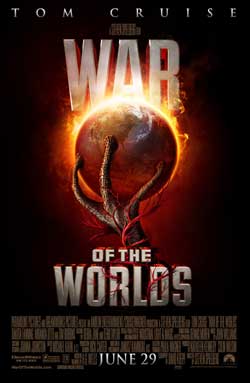 I have to admit that I was bummed that Tim Robbins was only giving a press conference at the War of the Worlds junket. I’ve long admired the guy and his politics, and I was hoping for a more intimate setting. But alas, I had to share him with 119 other journalists.
I have to admit that I was bummed that Tim Robbins was only giving a press conference at the War of the Worlds junket. I’ve long admired the guy and his politics, and I was hoping for a more intimate setting. But alas, I had to share him with 119 other journalists.
That’s OK – he had some good stuff to say, even when the questions weren’t that great. Robbins’ role in the film is small, but pivotal, and he delivers a speech that I think is the key to the subtext of the movie.
When you’re done with this, head to our CHUD Goes to War! page to see the wrap-up of all our coverage, including my review of the film.
Q: Can you characterize working with Spielberg? What’s his strength – effects scenes or character scenes?
Robbins: His strength is that he’s able to make all kinds of different movies. What was great about this movie, and what I was really impressed about with working with him, is that he’s managing a major epic here. The invasion of the world and these incredible tripod creatures, massive carnage and mayhem – and he’s doing that at the same time that he’s really understanding the emotional life of all these characters, and guiding us actors through that journey. To know really what was going on emotionally with my character when we were talking on the set – it’s the best of both worlds, a person who can know in his head the different effects that will be happening but doesn’t forget to talk to you as an actor. I found it an extraordinary experience.
Also, he’s a good guy. A family person. The set was wonderful, very supportive. I had a great time doing it.
Q: Do you think post 9/11 it’s possible for us to be scared by anything from off of this planet, and do you see parallels to contemporary life in this film?
Robbins: I think people have to draw their own parallels. I certainly did when I saw it a couple of days ago. I think the original novel was a warning about the quickness that modernization and industrialization was happening. But each generation has applied their own fears to it. In the 30s when Orson Welles did the radio play there was the impending fascism in Europe. In the 50s when they did the movie there was the Communist threat. Today we’re living in times when there’s a different fear. Each generation will find its own interpretation of this classic novel.
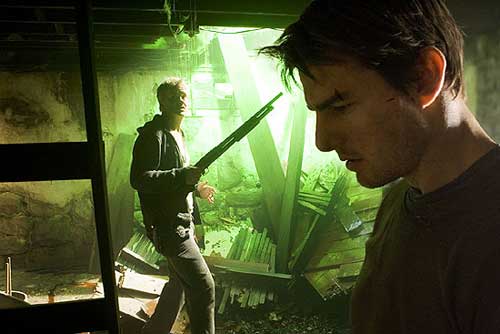
Q: What did you do to prepare for the role? Did you read the book? Watch the movie? Or did you not want to be burdened with that?
Robbins: I didn’t watch the movie but I did read the book. There’s nothing better than a piece of literature to get you interested in a character. It gives you details of the character, psychological details that are not usually in a script. I found that beneficial. Also, most of it’s in the imagination. Imagining the terror that must exist in all these people. To me the most terrifying scene in the movie is when Tom and Dakota and the son are driving in the car and it’s overtaken by this mob. For me, the way it’s directed – that’s something that could easily happen. When you’re watching the scene you realize that does happen. That’s being done by housewives and farmers and people who were living normal, decent lives two days before and have been turned into a desperate mob by this invasion. For me it rang so true and it was such a tragedy because you realize it was decent people that were doing this. In capturing that – throughout the movie – capturing how human nature can change in an instant when faced with terror.
Q: I’m curious about your relationship with science fiction in regards to its ability as a vehicle to touch the political zeitgeist and speak to the human condition.
Robbins: It certainly allows for metaphor, and allows the ability to create another world so that it’s not so directly literal in the story you’re telling and what you’re trying to say with it. I don’t read a lot of science fiction, though, and I don’t imagine I could write it. I suppose I could try at some point. I love watching it. I love science fiction movies.
I’ve done a few. I did a movie called Code 46 a couple of years ago that took place in the future. It was sort of a classical structure romance but with a twist, and the twist had to do with science and genetic modification. I find it a fascinating art form and I wish I could do it as a writer and director.
Q: Can you talk a bit about your character and what’s going on in his hand?
Robbins: The way I figured it when I was talking to Steven about it is that he was just like everyone else in the movie – he was, a couple of days before, a paramedic. Had a normal job and a family and all of a sudden was thrown into this terrible situation. He sees his family disappear in front of his eyes, he runs – in a very human way you get away from that kind of thing. When you’re a paramedic your job is to stay and help as many people as you can but, like Tom’s character, you realize that’s futile to stay. Their power is so immense and overwhelming there’s no point. What happens to a human being under these kinds of circumstances? You turn to base survival, you turn into an animal. To some degree you lose your rationality, you lose your mind. For me, I had a lot of compassion for this character because it’s not any action of his that have led him to his deranged state of mind.
That’s kind of true of all the characters in the movie. No one can be blamed. It’s what happens when there’s this immense attack against your country.
Q: In the film you have to wrestle Tom Cruise. You’re a tall guy, he’s a smaller guy. Can you get into the physicality of those scenes? He has to appear almost as vicious as you.
Robbins: I don’t care what size you are, when your kid is in the room you become twice the size. As an actor I allow for that to happen. Also it’s got to be a strong enough struggle that he’s threatened by me. But you know, Tom when we were doing this – I never got the feeling it was an issue. Which is a testament to him. If you look at his films over the years, he surrounds himself with really talented people. He works with really talented actors. There are some that get into that position that don’t do that and are afraid of that. He’s a really great actor and he goes toe to toe with you. He matches your state, your emotion, he feeds off it, he’s there off camera for you, completely generous in his spirit. He’s tremendously energetic and motivating on a set.
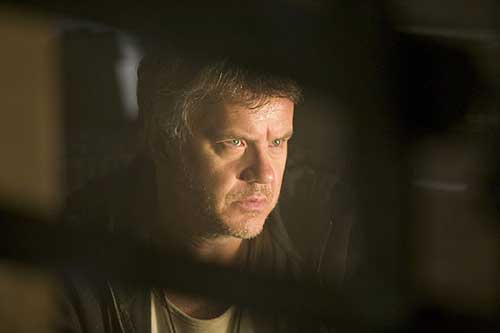
Q: As a New Yorker do you see parallels to 9/11 and the blackout?
Robbins: Well, this is something that I think he did which is really brilliant – he didn’t go after iconographic New York buildings and destroy them, which so many movies do. I really appreciated that it starts in New Jersey and New York is off on the skyline. You hear that something happened but you don’t see this – which I gotta say, as a New Yorker, I find it kind of exploitative when they’re always frickin’ ruining my city in films. All of these films have destroyed New York, all the way back to Planet of the Apes!
As a New Yorker I probably view this like a person from Los Angeles would. It’s done in that way so that it’s not simply about making this a New York metaphor. I think the choice to start in New Jersey and go up into rural farm country is a very wise choice. It tells the story of the entire country that way.
Q: If HG Wells was still living and saw this movie, what do you think he would say about it?
Robbins: I think he’d like it. First of all he’d come to understand that most science fiction in the 20th century was influenced by him. In order for science fiction to continue to be a modern art form it has to be reinterpreted and re-evaluated. I think that the brilliant thing that was done in the adaptation was giving the main character deep flaws and a family that he had to help survive. In the novel it’s simply one man’s journey. Here it becomes a journey not only of the survival of the self, of physical survival, it also becomes a journey of survival of others. Someone who has failed in the past to be a good father has to rise to the occasion and find out about his kids. Find out how to sing a lullabye.
People that remain too true to every letter when adapting novels deny a step that has to happen in films. You take a step beyond what the writer did and take it into a different level of communication. I think he did a great job with this.
Q: What would ET say?
Robbins: ET would be pissed, I think.
Major spoilers follow. Swipe the text to read it.
Q: In this film, like in the other versions, it’s germs that kill the aliens, not man. The war is won by naturally occurring germ warfare. As someone who thinks about contemporary issues, do you think this might have a different meaning today?
Robbins: The brilliance of that in the novel is that it can operate on so many levels. It’s saying that this land is meant for a certain kind of person to live on and you can conquer but you can never really inhabit. You can apply that all across the world. You can even apply that here. There are people in this country who don’t care much for democracy, and they’re trying to subvert it. They’re going to lose. It might take a while, but they’re going to lose. The spirit of this country is free and open and won’t tolerate oppression or lack of rights.
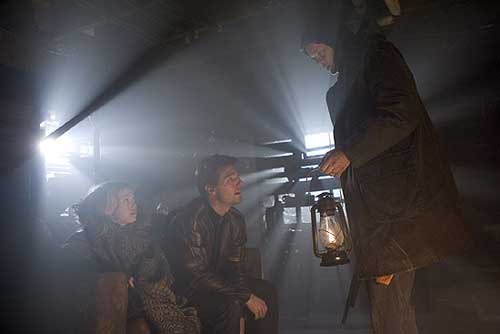
Q: You talked before about having done several genre films in the past. I wanted to throw three of your past films at you and ask about Zathura as well. So, Jacob’s Ladder, Mission to Mars, and I’m going to say the three words – Howard the Duck. How do you look back on those three and can you tell us about Zathura?
Robbins: Hmmm. I don’t think much about Howard the Duck. [laughs] Jacob’s Ladder – that’s a really good movie. I don’t know if it’s science fiction, though. And Zathura is another adventure film, more of a little kid’s adventure movie. It’s coming out in November. I just came in for a week and worked on that film, I’m not in much of it.
Q: You have worked with two directors known for their economy – Spielberg and Clint Eastwood. Can you compare their work?
Robbins: I think Steven is producing Clint’s next movie. Both of them are really good with actors, both of them run sets that are genuinely nice to be on. Very little tension, if any at all. Complete professionals that they have been working with for a long time. Crews that know what they’re doing, and a good direct level of communication with the actors. They’re both pros, you know? It’s what happens when you do something for a long time and you do it on a regular basis. You realize the tension and struggle is unnecessary. You can get a job done without a bunch of noise on the set. You can get things done without the angst.
They work very fast. We’re all aspiring to Clint’s speed. Considering the amount of time Steven had to do this movie and that he got it done and it’s out next week is remarkable.
Again, spoilers ahead.
Q: The arc of your character is dramatic, but offscreen. Is it difficult as an actor to only embody the end of it and not go through the journey?
Robbins: No, because I like the economy of that and the challenge of it. The first hour of the film there’s this slow build that I think is really scary. When it starts to come out of the ground, with these effects and the terror – it’s a really terrifying film to watch. You get to the middle of the film and now it’s all been distilled into one basement and one character. Somehow we have to create a terror in that basement that was worse than what happened before. That was what was exciting about it. If it had gone on too long that would have been wrong – it had to resolve and he had to move on. It would have been a different movie if I had joined forces with him at that point. There’s a real moral decision Tom Cruise’s character has to make at that point. I don’t want to give it away, but that’s one of those difficult, morally ambiguous decisions that take place in situations like this.
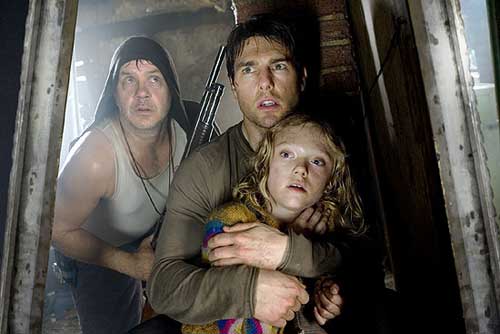
Q: What do you believe about life on planets other than ours?
Robbins: I’m not sure intelligent life exists here. No, that’s an old line, I stole that. Who’s line is that?
No, I’m sure that out there somewhere there’s something living. I’m not sure it’s worth the money to find out. Let it be magical. Who said when we landed on the moon it killed a whole section of romance. All those great moon songs. I think the imagination is important in regard to the universe and space, but I don’t see spending billions of dollars to see if there’s life somewhere else as a good use of money. Better to use that money to make the quality of life better here.
Before I leave, I want to make a shameless plug for Embedded Live, my play that I made into a film. It’s available at Netflix and embeddedlive.com.
Q: Can you tell us about it?
Robbins: It’s a satire on the Iraq war. It involves journalists, the decision makers and tells some of the stories of the soldiers over there. That part is respectful. It tells the difficulty of when the media tries to use soldiers for their own purposes.